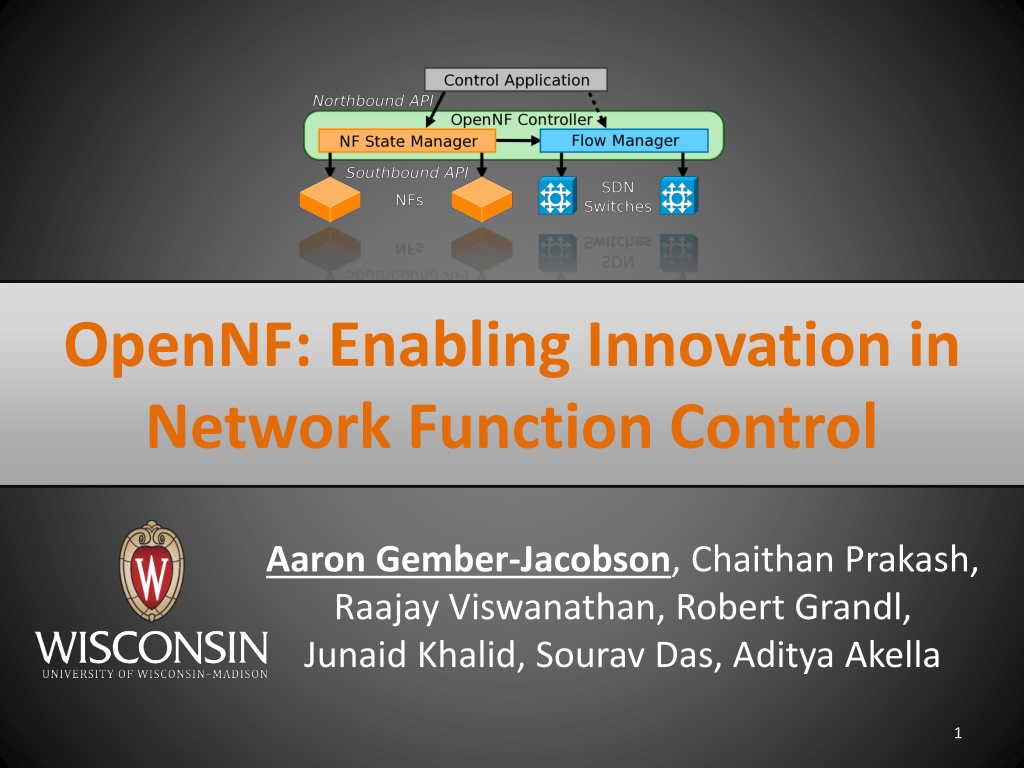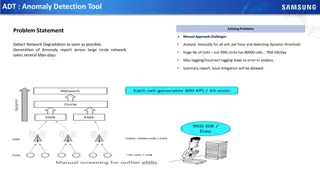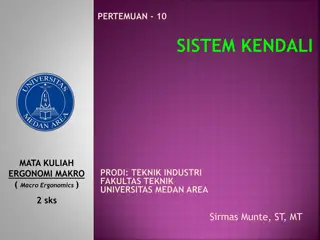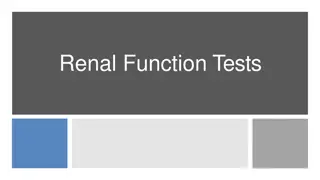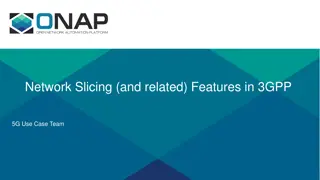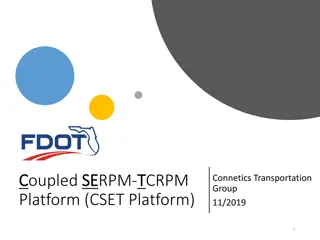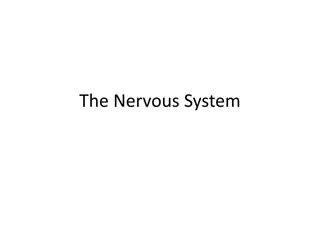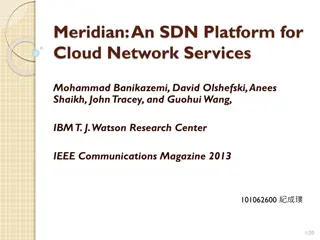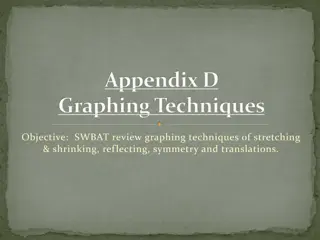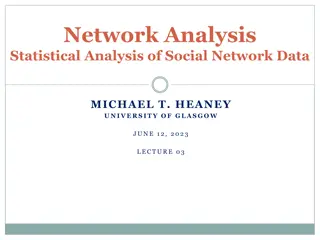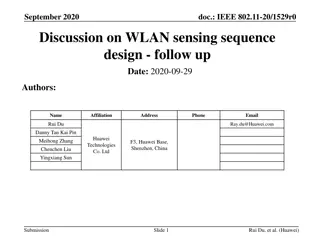OpenNF: Enabling Network Function Control
OpenNF enables innovation in network function control by supporting various network functions, dynamic allocation of instances, and addressing challenges such as packet loss and SLA fulfillment. The architecture focuses on state export/import, operation guarantees, and efficient handling of NFs with minimal changes. It aims to enhance performance, reduce costs, and improve traffic monitoring in network environments.
Download Presentation

Please find below an Image/Link to download the presentation.
The content on the website is provided AS IS for your information and personal use only. It may not be sold, licensed, or shared on other websites without obtaining consent from the author.If you encounter any issues during the download, it is possible that the publisher has removed the file from their server.
You are allowed to download the files provided on this website for personal or commercial use, subject to the condition that they are used lawfully. All files are the property of their respective owners.
The content on the website is provided AS IS for your information and personal use only. It may not be sold, licensed, or shared on other websites without obtaining consent from the author.
E N D
Presentation Transcript
OpenNF: Enabling Innovation in Network Function Control Aaron Gember-Jacobson, Chaithan Prakash, Raajay Viswanathan, Robert Grandl, Junaid Khalid, Sourav Das, Aditya Akella 1
Network functions (NFs) Perform sophisticated stateful actions on packets/flows WAN optimizer Caching proxy Intrusion detection system (IDS) 2
NF trends NFV dynamically allocate NF instances SDN dynamically reroute flows WAN optimizer Dynamic reallocation of packet processing Caching proxy Xen/KVM Intrusion detection system (IDS) 3
Example: elastic NF scaling 1. Satisfy performance SLAs 2. Minimize operating costs 3. Accurately monitor traffic CPU Packet loss 4
Example: elastic NF scaling Problem: NFV+SDN is insufficient To simultaneously 1. Satisfy performance SLAs 2. Minimize operating costs 3. Accurately monitor traffic CPU Cannot effectively implement new services or abstractions! Packet loss 5
Why NFV + SDN falls short ? Packet loss SLA: <1% 1. SLAs 2. Cost 3. Accuracy ? Reroute new flows [Stratos - arXiv:1305.0209] Reroute existing flows [SIMPLE - SIGCOMM 13] Wait for flows to die [Stratos - arXiv:1305.0209] 6
SLAs + cost + accuracy: What do we need? Quickly move, copy, or share internal NF state alongside updates to network forwarding state Guarantees: loss-free, order-preserving, 1 2 3 Also applies to other scenarios 7
Outline Motivation and requirements Challenges OpenNF architecture State export/import State operations Guarantees Evaluation 8
Challenges 1. Supporting many NFs with minimal changes 2. Dealing with race conditions Packet Route Update State 3. Bounding overhead 9
OpenNF overview Control Application move/copy/share state OpenNF Controller NF State Manager Flow Manager export/import State 10
NF state taxonomy State created or updated by an NF applies to either a single flow or a collection of flows Multi-flow state Per-flow state TcpAnalyzer Connection HttpAnalyzer ConnCount Connection TcpAnalyzer All-flows state Statistics HttpAnalyzer 11
NF API: export/import state Functions: get, put, delete put Per Scope Multi All Filter get NF No need to expose/change internal state organization! 12
Control operations: move Control Application Flow Manager move (port=80, Bro1, Bro2) forward(port=80, Bro2) NF State Manager get(per, port=80) put (per, Chunk1) [Chunk1] del(per, port=80) put (per, Chunk2) [Chunk2] Bro1 Bro2 Also provide copy and share 13
Lost updates during move detect- MHR R2 R3 move(red,Bro1 ,Bro2 ) Missing state Missing updates R1 R2 B1 Bro1 Bro2 Loss-free: All state updates should be reflected in the transferred state, and all packets should be processed Split/Merge [NSDI 13]: pause traffic, buffer packets Packets in-transit when buffering starts are dropped 14
NF API: observe/prevent updates using events NF R1 Only need to change an NF s receive packet function! 15
Use events for loss-free move 1. enableEvents(red,drop) on Bro1 2. get/delete on Bro1 3. Buffer events at controller 4. put on Bro2 5. Flush packets in events to Bro2 6. Update forwarding R3 R1 R2 R1,R2 R1,R2,R3 R1 Drop R2 Bro1 Bro2 16
Re-ordering of packets False positives from Bro s weird script Controller 5. Flush buffer 6. Request forwarding update Switch Bro2 Bro1 R2 R2 R3 R2 R3 R4 R3 R4 R3 R3 Order-preserving: All packets should be processed in the order they were forwarded by the switch 17
OpenNF: SLAs + cost + accuracy 1. Dealing with diversity Export/import state based on its association with flows 2. Dealing with race conditions + Events Lock-step forwarding updates 18
Implementation Controller (3.8K lines of Java) Communication library (2.6K lines of C) Modified NFs (3-8% increase in code) Bro IDS iptables Squid Cache PRADS 19
Overall benefits for elastic scaling Bro IDS processing 10K pkts/sec At 180 sec: move HTTP flows (489) to new IDS At 360 sec: move back to old IDS SLAs: 260ms to move (loss-free) Accuracy: same log entries as using one IDS VM replication: incorrect log entries Cost: scale down after state is moved Stratos: scale down delayed 25+ minutes [arXiv:1305.0209] 20
Evaluation: state export/import Cost grows with state complexity Serialization/deserialization costs dominate 21
Evaluation: operations PRADS asset detector processing 5K pkts/sec Move per-flow state for 500 flows 881 packets in events 500 200 Per-packet Latency Packets dropped! 686 Move Time (ms) 400 150 Increase (ms) Bro: 5% of alerts missed! 300 462 100 200 50 100 0 0 Average Maximum 1120 pkts buffered NG NG NG PL LF PL+ER OP PL+ER NG PL LF PL+ER 838 pkts in events + Operations are efficient, but guarantees come at a cost! 22
Conclusion Dynamic reallocation of packet processing enables new services Realizing SLAs + cost + accuracy requires quick, safe control of internal NF state OpenNF provides flexible and efficient control with few NF modifications http://opennf.cs.wisc.edu 23
Backup Related work Copy and share Order-preserving move Bounding overhead Example control application Evaluation: controller scalability Evaluation: importance of guarantees Evaluation: benefits of granular control 24
Existing approaches Virtual machine replication Unneeded state incorrect actions Cannot combine limited reallocation Split/Merge [NSDI 13] State allocations and accesses occur via library Addresses a specific problem limited suitability Packets may be dropped or re-ordered wrong NF behavior 25
Copy and share operations Used when multiple instances need some state Copy no or eventual consistency Once, periodically, based on events, etc. Share strong or strict consistency Events are raised for all packets Events are released one at a time State is copied before releasing the next event Copy (multi-flow): 111ms Share (strong): 13ms/packet 26
Order-preserving move Flush packets in events to Inst2 enableEvents(blue,buffer) on Inst2 Forwarding update: send to Inst1 & controller Wait for packet from switch (remember last) Forwarding update: send to Inst2 Wait for event for last packet from Inst2 Release buffer of packets on Inst2 B3 B3 B4 Buf B1,B2 B1,B2, B1,B2, B1 B3 B3,B4 Drop B3 B1 B2 27
Bounding overhead Applications decide (based on NF & objectives): 1. Granularity of operations Per Multi Filter Scope All 2. Guarantees desired + 1 2 3 LF None LF+OP 28
Example app: elastic NF scaling scan.bro vulnerable.bro weird.bro movePrefix(prefix,oldInst,newInst): copy(oldInst,newInst,{nw_src:prefix},multi) move(oldInst,newInst,{nw_src:prefix},per,LF+OP) while (true): sleep(60) copy(oldInst,newInst,{nw_src:prefix},multi) copy(newInst,oldInst,{nw_src:prefix},multi) 29
Evaluation: controller scalability Improve scalability with P2P state transfers 30
Evaluation: importance of guarantees Bro1 processing malicious trace @ 1K pkts/sec After 14K packets: move active flows to Bro2 Alert Incorrect file type MHR Match MD5 Total Baseline 26 31 116 173 NF 25 28 111 164 LF 24 27 106 157 LF+OP 26 31 116 173
Evaluation: benefits of granular control HTTP requests from 2 clients (40 unique URLs) Initially: both go to Squid1 20s later: reassign Client1 to Squid2 Ignore 117 Crash! 0 MB Copy-client 117 39 4 MB Copy-all 117 50 54 MB Hits @ Squid1 Hits @ Squid2 State transferred
